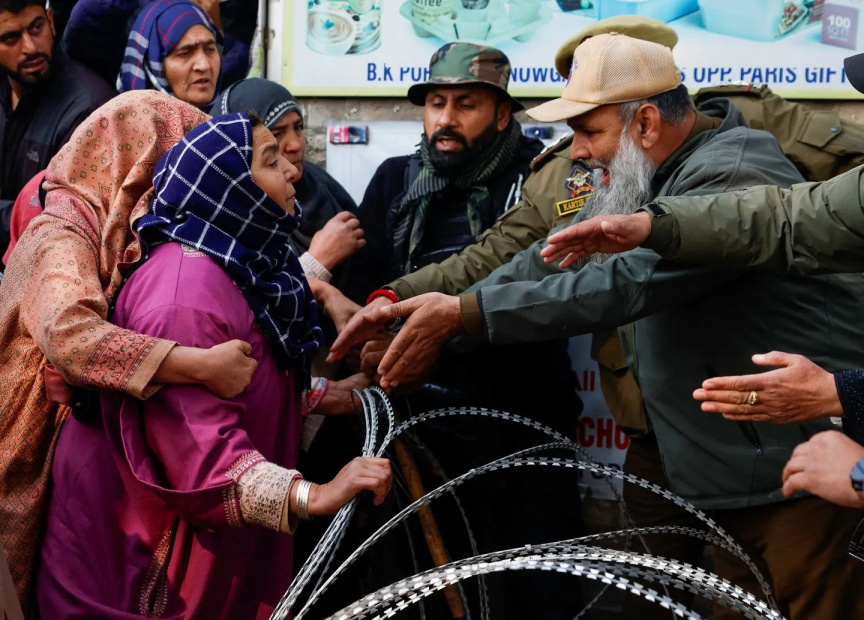
UN experts have raised serious concerns about alleged human rights violations carried out by Indian authorities in Jammu and Kashmir in the aftermath of the last April attack in Pahalgam. (Photo/via TRT)
UN experts have raised serious concerns about alleged human rights violations carried out by Indian authorities in Jammu and Kashmir in the aftermath of the last April attack in Pahalgam, which killed 54 people.
The experts said they were alarmed by the scope and severity of the measures implemented across the region and warned that India must uphold international human rights law even while responding to serious security threats.
In a statement, the experts said: "We unequivocally condemn the brutal terrorist attack on a tourist area and extend our condolences to the victims, their families, and the Government of India. However, all governments must respect international human rights law while combating terrorism."
Following the attack, Indian authorities launched widespread operations throughout Jammu and Kashmir.
According to the experts, these operations resulted in the arrest and detention of around 2,800 people, including journalists and human rights defenders.
Some detainees were held under the Public Safety Act and the Unlawful Activities (Prevention) Act, laws that allow extended detention without charge or trial and contain definitions of terrorism that the experts said are vague and overly broad.
Reports received by the experts indicated that some detainees were allegedly tortured, held incommunicado and denied access to lawyers and family members.
"We condemn reports of arbitrary arrests and detentions, suspicious deaths in custody, torture and other ill-treatment, lynchings, and discriminatory treatment of Kashmiri and Muslim communities," they said.
The experts also highlighted accounts of punitive house demolitions, forced evictions and arbitrary displacement.
These measures were reportedly carried out against families of individuals perceived as supporting militants, often without court orders or due process.
According to the statement, such actions "constitute collective punishment and defy the 2024 ruling by India’s Supreme Court, which found that such demolitions are unconstitutional and violate the rights to life and human dignity, which includes the right to protection against arbitrary displacement."
Media restrictions
Concerns were also raised about communication blackouts and restrictions on press freedom.
Authorities reportedly suspended mobile internet services and blocked around 8,000 social media accounts, including those belonging to journalists and independent media outlets.
The experts said such measures represent disproportionate restrictions on freedoms of expression, association and peaceful assembly.
The effects of India’s response reached beyond Jammu and Kashmir.
According to the experts, Kashmiri students in other parts of India faced surveillance and harassment after the Government issued directives requiring universities to collect their personal data.
The experts also reported an increase in hate speech and incitement to violence against Muslims, allegedly fuelled by political figures from the ruling party.
Demolitions were further reported in Gujarat and Assam, where the experts said thousands of Muslim homes, mosques and businesses were destroyed.
The statement also noted that nearly 1,900 Muslims and Rohingya refugees were expelled to Bangladesh and Myanmar, often without due process.
The experts said: "Such expulsions violate the international obligation of non-refoulement, which prohibits returning individuals to countries where they risk persecution, arbitrary deprivation of life, torture, or other serious harm."
Ongoing violations and calls for accountability
The statement underscored that these concerns reflect longstanding patterns of violations in Jammu and Kashmir.
Several human rights defenders, including Irfan Mehraj and Khurram Parvez, have been arbitrarily detained under security laws for years, according to the experts.
They called for the immediate release of anyone detained arbitrarily.
"We urge the immediate unconditional release of all individuals arbitrarily detained in Jammu and Kashmir," they said.
The experts urged the Government of India to ensure its counter-terrorism laws and practices comply with international human rights standards.
They called for independent investigations into all alleged violations and for accountability mechanisms, including prosecutions, where necessary.
"Excessive counter-terrorism measures not only violate human dignity, the Indian Constitution and international law, but counter-productively fuel social division and grievances that can spiral into further violence," the experts warned.
The statement concluded with an appeal for dialogue between India and Pakistan, urging both governments to commit to a peaceful resolution of the long-running dispute over Jammu and Kashmir.
"We urge the Governments of India and Pakistan to peacefully resolve the long-running conflict over Jammu and Kashmir, which has fuelled human rights violations and the destructive cycle of cross-border violence," they said.
___
Source: TRT